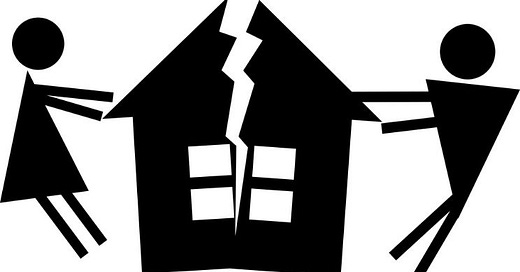Ed. note: See last week’s entry on grieving lost friendships
You could feel the tremor rip down the center of O’Donnell Street the day news got out that one of our neighbors was getting divorced.
There were couples who got divorced after leaving the neighborhood where I was raised1 and others that were divorced before moving in. This was the first one that happened in our midst. No one saw it coming, but I guess we all put up our fronts for public display at porch parties and summer cookouts. Who really knows what happens when the beer runs out and everyone retreats to their respective homes?
It’s easy to say that the 1980s were a simpler time2. I think a lot of people stayed together for the kids, denying the reality that they didn’t like and/or love their spouse. I also think religion played a role; Catholics populated nearly every corner of my world and the institution typically frowns on the practice.
I used to feel badly when I heard someone was getting divorced, for what I think are obvious reasons. One time, a friend had mentioned that they were divorcing their spouse and I said that I was sorry to hear that. Their response: “I’m not.” This friend said it was a long time coming and that the divorce was freeing for them both, unshackling them from something of which they no longer wanted to be a part. It changed my perspective on the topic.
When I started writing Dirt Nap , one of the first topics we discussed was anticipatory grief, or the practice of grieving a loss before it happens. Take my friend from above. It was a long time coming. The divorce freed them from something they no longer wanted. Change one or two words and it sounds like something you might say after someone dies from cancer: “It was a long time coming. Their passing freed them.” You can hear the relief in both strings of thought that pain has been lifted and the people involved are in a better place3.
Consider Elizabeth Kübler-Ross’ stages of grief:
Denial and Anger are separate stages but pretty straightforward
Bargaining, or negotiating with themselves, the other person or a higher power to fix everything
Depression, or the despair at the end of the marriage
Acceptance, or moving on
These are not boxes you check off after someone dies. It’s not that neat and easy; if it were, everyone would do it. They are organically occurring stages of your grief. Some people don’t get past the denial and anger4; others get lost in the depression.
I read something recently that was written by a person who had been divorced:
It’s the grief I sometimes try to run away from through distraction or numbing. But running away never works. Grief will continue to chase you until you sit with it and feel it, even if you think you’ve felt all you can bear, and even if you’re angry there is still more.
She described the day her divorce was finalized as the happiest in her life, but the loss of the marriage was what she grieved because it led to severed relationships, the end of good routines, lost time with her children and, ultimately, the feeling of hope for what could have come.
Now, this is the part of this week’s essay where I tell you that I’m writing about something to which I cannot relate as I’ve been married for 22 (largely) happy years5. So, I reached out to some friends who have been divorced and three strong-ass women responded to my very open-ended questions:
Have you experienced any stages of grief for your marriage? If yes, can you describe what you felt. If not, what was the prevailing feeling you had?
Do you think that you pre-grieved your marriage ending and how?
Considering all of that, how are you?
They consented to my sharing their answers with you, which I’m going to do anonymously. Their answers are separated by the large quote boxes like the one below. Any bolding is mine and their answers were edited for brevity and clarity.
He had been not just my spouse but my literal best friend and partner in every single aspect of my life. I thought we would be together until literal death. Because he told me so. We told each other. It was a very harsh and hurtful concept to understand.
I know I went through the denial phase pretty heavily. It was masked, and rightly so to an extent, with the feeling that I must save my family. I remember one time, months into this strife, my brother told me, “You need to accept that your marriage is over.” I was very mad at him; my other brothers told him to stop being so heavy-handed, although I think they privately agreed. First of all, no one likes to be told things about their personal life from their big brothers, but also, I couldn’t possibly conceive that it could be over. We had been together 21 years. How could this end? I simply could not imagine a livable future without (him). I did not think I could function without him. One time at the grocery store I was walking down the baking aisle. I passed the muffin mix. (He) made muffins every weekend. I felt physical pain and almost felt like I was going to fall over. I remember grabbing the side of the shelf. How could I go on? Who would make the muffins now, and care for me and the kids this way? It’s still a painful memory.
He had been not just my spouse but my literal best friend and partner in every single aspect of my life. I thought we would be together until literal death. Because he told me so. We told each other. It was a very harsh and hurtful concept to understand. People lie. Promises are broken.
I also felt a great deal of anger. But was this anger part of the grieving process or just part of the normal response to being duped? Both, I suspect. My anger is harder for me to talk about, as it brings up feelings of anger and injustice. I was lied to and used and mistreated. So were my kids, to an extent, and this infuriates me. But also, for a long time, I had a real feeling that I had been robbed. Not only my future and my stability, but my past. For a long time I felt as if my past was taken from me too. Those memories were tainted. Good times were questioned. Good deeds looked at suspiciously. I’ve stopped doing a lot of that now, refusing to allow myself to rewrite the good times. I try to take them as what they are: happy memories. I don’t dwell though. I try to create space for new ones.
So, I try not to touch upon my anger much. But there have been a few key times when being angry was important: finally breaking away, finally filing the paperwork. I've found that anger can be a very useful emotion for me at times.
Regarding the stages of grief…
Bargaining I’m not so sure about. Maybe this phase is under the umbrella of “I must save my family,” “I will accept less and less, for my family,” “I will be treated worse and worse for my family.” In the end though, this was just a cop-out on my end.
I felt actual physical pain on the termination of our relationship. Although it would take many months to hash out details and plans, when he moved out, initially I was devastated. I stopped eating and I never slept. I was already isolated because of Covid. I listened to 80s power ballads on full volume. I’ve never felt such trauma and pain in my entire life. This translated into depression. For many, many months I was just obliterated mentally and emotionally. I was wrecked.
Acceptance has been a happy and relieving stage for me. Coming to accept my new life and new situation has been wonderful. When I let go of anger, confusion and heartbreak, I've found room for new hobbies and new people. I am firmly in control of my own life and not a victim to someone else's trauma, issues and whims. Acceptance has allowed me to move forward. Do what is best for me and make myself scarce when necessary.
I think my ex-husband did a very good job of gaslighting me and rewriting history. He had to distance himself from our past and our family to leave. I think I was too gobsmacked and confused, and stuck in denial for too long. Keeping me confused wasn’t an accident; it was deliberate and I have resentment that so much of my time was wasted by his obfuscation.
So, given all this, I’m doing well. I still have nightmares about when he left. I feel resentment and an incredible sense of injustice, but less and less. What I feel now mostly is a sense of peace in my life and an excitement for the future. The choices, the failures, the messes, the joy, it’s all mine. It belongs to me and I’ve earned it, and it feels good.
I used to have brief daydreams about what I would do if I had that additional money, and NO ONE to tell me how I should spend it. Those thoughts made me feel better, and I suppose I should have realized then what was beginning to happen.
I think it happened long before I actually realized it was happening. When I began to compromise myself — my personality, my dreams, desires, wants, friends, family, integrity, beliefs, even my professional name — I believed that compromise was what you were supposed to do when you were married, and I was absolutely in denial because it wasn’t until I began dipping my toes into anger and depression that I realized it was not the norm. And, I was the only one compromising.
It took a long time for me to accept it, and quite frankly, I still struggle to accept it. I have a hard time admitting defeat. I don't like to fail. Due to many years working in industries that were regimented and required results as proof of success, I often found myself second-guessing the decision to leave or if I needed to compromise myself a little bit more to finally be seen by him. BUT because of the supports of others, I am learning to accept that what needed to be done has been done.
OH YES... thank you Covid. I remember that in the thick of Covid — when he was not working and I was — he became resentful that I spent all day every day in front of a computer while he had to occupy himself and be respectful that I had to work. He also became resentful that I began to make more money than him, often pressuring me to spend more on material items he thought I needed or pay more towards our bills. I remember feeling more like an ATM than a spouse. I used to have brief daydreams about what I would do if I had that additional money, and NO ONE to tell me how I should spend it. Those thoughts made me feel better, and I suppose I should have realized then what was beginning to happen.
(Bonus side note: Looking back now, I think he was grieving our marriage before we even got married. When we fought, one of his usual talking points was if he had it to do again, he would have postponed our wedding. He often denied responsibility in our issues and blaming the death of his father for whatever foul behavior he was exhibiting. He told people that our wedding day was a solemn day because his dad wasn't there, knowing full well that I too had a mother who was not alive to be there.)
On how she is doing…
I'm basically one of those orange Home Depot buckets filled with flammable garbage juice. Honestly, it’s much better then what I was on this day last year, which was an Olympic-sized swimming pool filled with flammable garbage juice. Each day is a touch better then before, and each week I slowly gain back a little bit of the old me. I think that's truly the best thing for someone like me, who is a year and a half removed from a marriage that looked nothing like what they hoped for.
I felt justified the entire time and, if I’m being honest, I still believe my anger was justified each time. Although I fully accept my life as it is now, I’ll admit it’s easy to slip into angry feelings more than any other phase for me.
I distinctly remember two phases: anger and acceptance. I remember feeling exhausted at first, and triggered by everything my ex-husband would do. Looking back, now that I experience acceptance, there was no winning for him. I felt justified the entire time and, if I’m being honest, I still believe my anger was justified each time. Although I fully accept my life as it is now, I’ll admit it’s easy to slip into angry feelings more than any other phase for me.
On anticipatory grief:
I had decided to end my marriage before letting my ex-husband know, which allowed me to process a significant amount of the feelings before he was able to begin experiencing them. I think this made the process much easier for me, and maybe harder for him since he went through the process on his own, essentially.
On how she is doing:
My life is complete and full, although certain events are hard, like holidays and other shared events. It can sometimes be hard to navigate these circumstances, especially with extended family present who aren’t always sure how to interact with everyone, making it more awkward. The more layers and people involved, the harder and more complicated it can be.
Share your story
Not all grief is about the death of a person. A Griever’s Digest can be about the loss of a relationship, a job or something meaningful but inanimate. Consider sharing your grief with a bunch of strangers. Email me at jaredpaventi at gmail dot com.
Final thoughts on finality…
“The groom should not see you in the dress just before the wedding, that’s bad luck. You know what’s worst luck? Getting married itself. I’ve read studies. It’s like 2 out of 3 of those end in divorce, sometimes more, 3 out of 2.”
― Alex Moody, played by David Duchovny, Californication
Dirt Nap is the Substack newsletter about death, grief and dying that is written and edited by Jared Paventi. It’s published every Friday morning. Dirt Nap is free and we simply ask that you subscribe and/or share with others.
We are always looking for contributors and story ideas. Drop us a line if you have interested in either space at jaredpaventi at gmail dot com.
I’m all over social media if you want to chat. Find me on Facebook, Twitter/X and Bluesky. I’m on Threads and Instagram at @jaredpaventi. You can try messaging me on LinkedIn, but I don’t check my messages regularly.
If you or someone you know is in crisis, call or text 988 to reach the Suicide and Crisis Lifeline or chat live at 988lifeline.org. For additional mental health resources, visit our list.
One was a doozy. Actually, that ripped a seam down the street. Turns out that husband’s job was relocated to another upstate city. Mom and kids remained local while dad had an apartment during the week. The family moved a year later and the house of cards collapsed when dad got mom and his girlfriend mixed up in a sitcom-style bungling. What a dumbass.
Ronald Reagan made everything better, right? Right?
Oh, the better place. We’ll have to do a dive into this phrase eventually.
I have an aunt who was lived in a constant state of anger until her own death. Another topic for another day.
Those first couple of years, when I was unemployed…oof. Money is a tough topic for couples, especially early on in a marriage.












